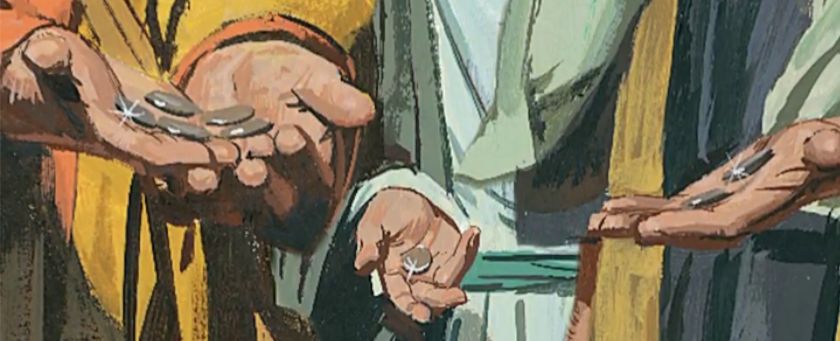Are we willing to risk using our talents to build the kingdom?
Thirty-Third Sunday of Ordinary Time, Year A

Readings:
Prv. 31:10-13, 19-20, 30-31; Ps. 128; 1 Thess. 5:1-6; Matt. 25:14-30
The Parable of the Talents is part of two chapters in Matthew’s Gospel dedicated to the coming of the kingdom. Jesus uses several images to teach his disciples what the kingdom of heaven will be like. Last week, we heard about the ten virgins, five who were foolish and five who were wise; today we hear about three servants, who receive talents according to their ability. Both parables illustrate the importance of being prepared and putting the gifts God gives us to good use.
The worthy wife in our first reading gives us an example of putting God’s gifts to good use: “She…works with loving hands…reaches out her hands to the poor, and extends her arms to the needy.” She is not seductive or vain, but rather, is praised for the good she does at the city gates. The good works of the worthy wife are an image of faith in action.
Along with putting our faith into action comes the need to persevere in our faith. When we struggle with our faith, so too will we struggle with our good deeds. When we become jaded or complacent with our faith, we are less likely to share our talents with others. St. Paul shows us an example of perseverance in faith in his letter to the Thessalonians, who were facing persecution for their faith in Jesus. Despite their challenges, St. Paul writes, “For all of you are children of the light and children of the day.” In other words, the good deeds of the Thessalonians were as plain as day, and because of that, they would not be caught off guard, like the five foolish virgins, who did not bring enough oil for their lamps.
And so, being prepared is an important part of the Christian life, as are the good works we do. The Parable of the Talents illustrates for us the value of putting our talents to work. A “talent,” in Jesus’ time, was a large sum of money. So, Jesus is using the analogy of a broker to show how each servant participates in growing the kingdom. The first two servants engage in trade and double the master’s deposit, the last servant buries his talent and earns nothing. The first servants are rewarded for doubling their talents, the last servant is cast out into the darkness for doing nothing. Now, I know we live in a world where everyone gets a trophy, but how can one who has been given so much, yet do so little, expect to be rewarded? Remember, the talent was given according to his ability, no matter how great or small.
Interestingly enough, according to an ancient source (Jeremias), burying money was regarded as the best security against theft. Anyone who has played the stock market knows there is always some level of risk involved when investing. And, as the saying goes, the higher the risk, the higher the reward. But, the last servant was unwilling even to put the money in the bank to at least earn interest. Instead, his fear got the best of him. He was afraid to risk using the talent entrusted to him.
What about us? How many talents has God given each of us? And are we willing to risk using those talents to build the kingdom? If there is anything this pandemic has revealed it is that we have been given a tremendous gift of faith. Our faith keeps us focused on Christ, who has entrusted us with many talents and encourages us to persevere.
So, as we gather around the table of the Lord to receive the greatest gift of all, let us be mindful of the many talents we have all been given, to use them for good in the world, so that we, like the first two servants may hear the Lord say, “Well done my good and faithful servant. Since you were faithful in small matters, I will give you great responsibilities. Come, share your masters’ joy.”
Given during the COVID-19 pandemic.





Share this post
Twitter
Facebook
Pinterest
Email